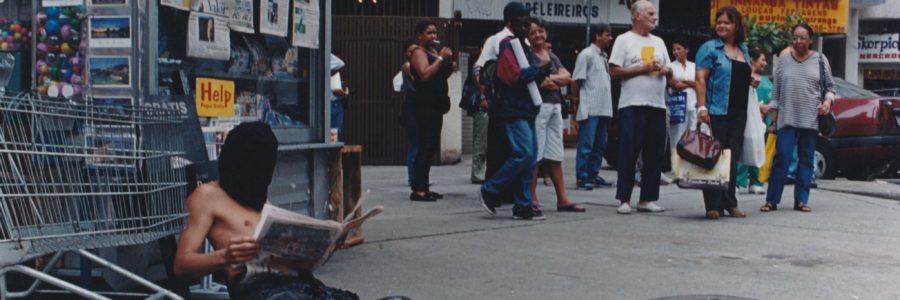
Contemporary Brazilian Art
Cabelo gets interviewed by Luiz Camillo Osorio
Luiz Camillo Osorio
Luiz Camillo Osorio I remember seeing you in the mid-1990s making performances with aquariums, fire and worms, and also going on stage with the band Boato. In both cases, there was a lot of concentrated energy — aesthetic, organic, musical, poetic, and vital. Talk a little about this relation between music, performance and poetry in your training and in your work.
Cabelo I dropped out of my college engineering course to raise worms. I was greatly fascinated by the alchemical power of those annelids to transform shit into humus. It was in that same period that, recovering from a serious infestation of various parasites, I made contact with poetry. This combination between worms and poetry set off a radical transformation, and made me aware of the poet’s ability to transform the material and immaterial dejects of civilization into humus. Since then, it is poetry that rules, it is the source, the matrix. It is an old wise woman with the body of a girl, and I seek to make myself available to attend to her whims. She manifests herself in a wide range of ways: the spoken word, the sung word, gestures, dance, performance… All synesthetically and simultaneously, so there is no way to separate it. I believe that, in Boato’s performance this is manifested in a very direct, organic and powerful way.
The various lines of force of your poetics — drawing, music, text, materials — have an expressive happening as their focus, always marked by the incisive presence of the body. A crawling body, animal-body, reptile-body and, at the same time, a word-body, voice-body, drawing-body with spiritual and aesthetic intonation. Horizontology and verticality. How do you see the place of the body?
The place of the body is here and now. Its presence at each moment of the crossing is primordial. For me, the challenge is how to administer, how to attend to the daily demand of energy. It is the poetic impulse that moves the boy, I like that road sign: “DESVIO OBRAS” [Detour, Works], because transgressions and detours are necessary for the realization of the work. I am interested precisely in the beauty and originality of the movements, of the maneuvers of this body, of its coming and going, so that the freedom of its language is fulfilled.
At your most recent exhibition at A Gentil Carioca, in 2012, you created a character, MC Fininho. There, more than the music, it was above all the throbbing of a prophetic-social energy that was implied. As though you saw in Carioca funk the greatest expression of resistance and rebellion to standardization and devitalization. Tell me a little about that.
Funk is one of the most authentic, powerful and original manifestations of Carioca culture, and it gives voice to a significant and still much discriminated segment of society. MC Fininho arose to give expression to the funk songs I composed and did not fit into my repertoire. I feel that my creative process, my production, is strongly identified with this rawness, with the spirit of do-it-yourself, with the slang, with the ability to sample and appropriate without the least ceremony. What interests me is precisely the manifestation of this libertarian, direct energy, which goes against the prevailing asepsis and anemia.
Is your drawing poetry, or is your poetry drawing? I think that these two forms of writing contaminate each other and are unfolded in your work. How do you articulate them?
Drawing is a physical necessity, a repetitive, compulsive, generally quick activity, that sometimes resembles a trance. With the written word it’s different: I begin to work based on a fragment, an insight, and afterwards the process of elaboration is slower. But at the moment that I write them down they are calligraphies, not drawings. Each curve of a letter, each word, is charged with intensity, and ordering them in the space is an exercise of composition. In the end, words and drawings are mixed in such a slippery way that they wind up being transformed into a single thing.